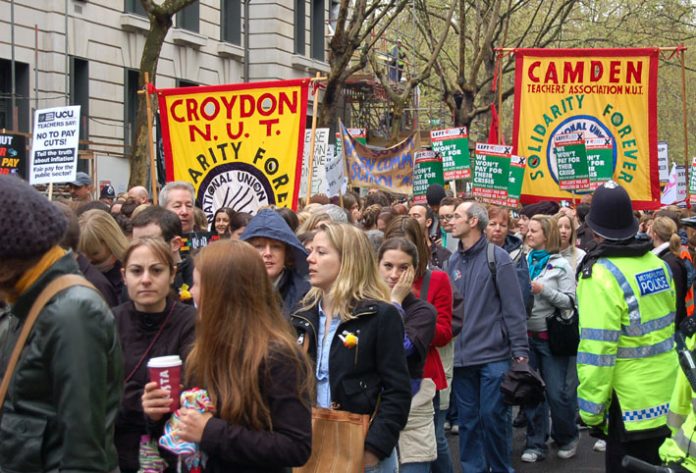A NINETY-children-to-a-class City Academy, where three-hour lessons are the norm, has been roundly condemned by leading anti-academy campaigner and NUT and ATL Executive member Hank Roberts, who called for industrial action to smash the Academy programme.
The RSA Academy in Tipton, West Midlands, which will have five-terms-a-year, a longer school day and year than usual and up to 90 children in a class at one time, was opened by the Duke of Edinburgh on Monday.
‘The trade unions must take the lead and take all action necessary, including industrial action, to defeat the academy education privatisation programme,’ Roberts told News Line.
An NUT press officer said: ‘Despite spending millions of pounds of taxpayers money, Academies are not accountable to their local communities.
‘Only their sponsors and the DCSF (Department for Children, Schools and Families) can have a say in the way they run.
‘When businesses take over schools then the voices of teachers, parents and the community in the running of their schools are lost.’
Alastair Smith from the Anti-Academies Alliance campaign group said: ‘The academies experiment has gone mad.
‘This is education on the cheap. It’s insane. The union policy is for 30 children to a class and that has to be enforced.’
Peter Jackson, another member of the Anti-Academies Alliance added: ‘It’s shocking. We’re told Academies are being set up to improve results and make education better for children.
‘But by putting 90 children in a class and having three-hour lessons this breaks all the sensible rules about how long children can concentrate and about one-to-one attention.’
The RSA Academy is sponsored by the Royal Society for the encouragement of Arts, Manufactures and Commerce.
Instead of the traditional academic syllabus, pupils are to be taught a curriculum called ‘Opening Minds’, covering five areas: citizenship, learning, managing information, managing situations and relating to people.
Matthew Taylor, chief executive of the RSA, said: ‘As a society that believes we need to radically rethink schooling for the 21st century, we believe the academy can implement other effective and innovative ideas, for example the five-term year’.
The RSA Academy is divided into three ‘schools’: maths, science and technology; arts, humanities, sport and leisure; and language and communications.
There will be a fortnight’s break between terms, and a four week summer break.
The school-day is divided into two three-hour lessons, with teams of staff working with each group.
It says students will have access to two ‘enrichment sessions’ each week, including courses such as Chinese or Spanish for beginners, growing your own vegetables and Young Enterprise.
Sir Mike Tomlinson, the ex-UK Chief Inspector of Schools, is to chair the Academy Trust and the governing body.
Hank Roberts condemned the new Academy, saying: ‘The government has been talking about having classes of 60, 70, 80, 90 and even higher for some time.
‘This is consistent with its talk of super teachers that will teach huge numbers with some teaching assistants that will basically police them.
‘It shows a complete lack of understanding that teaching is an interactive process and is not just standing at the front giving your pearls of wisdom and hoping that children will simply absorb them.
‘It is also, of course, about cutting expenditure, and in the current crisis we can expect a lot more of this.
‘The Academies are designed by the government not only to privatise education but, long term, to reduce the cost of it for ordinary working class kids.
‘Our job is to defeat them and not let them get away with putting the burden of this economic crisis, which they have nurtured and encouraged and are totally responsible for, on us.
‘I am sure that we will take this historic task on.’
Speaking about the long-running fight against the Wembley Park Academy, Roberts added: ‘They’ve opened a consultation period, now we’re going to show yet again overwhelming opposition and if they ignore the democratic wish of the people we will again consider direct action.
‘We will also look at the possibility of strike action.’
Commenting on the situation in nearby Camden, Roberts continued: ‘In Camden the parents are taking the education authority to court and the court case shows a fundamental flaw in what is already a fundamentally flawed process.
‘Basically the government are giving these schools to their mates and supporters,’ Roberts alleged.
‘Capitalism is supposed to be about competition, that’s a joke! So long as they’re making money, they couldn’t give a stuff about competition.’
Described as a landmark legal challenge against the government, the Camden case claims that the way academy sponsors are selected breaks European competition and procurement laws.
The case, which is being heard in the High Court this week, is seeking to overhaul the method for choosing sponsors and force local authorities to hold open competitions when making their decisions.
It is being brought by a parent who lives in Camden, north London, following the decision to open an academy there backed by University College London.
Two judicial reviews, one against Ed Balls, the Schools Secretary, and the other against Camden Council, are being heard at the same time.
Lawyers are arguing that academy sponsors gain a commercial advantage through an increased public profile and therefore the way they are selected should be made more transparent.
The judicial review will be told that the way that Camden Council chose UCL as its sponsor was secretive and did not allow others the chance to compete.
Richard Stein, a partner at Leigh Day & Co Solicitors, who is representing the claimant, said he was confident that this first ‘hard-edged’ challenge to the way academies are procured would be a success.
